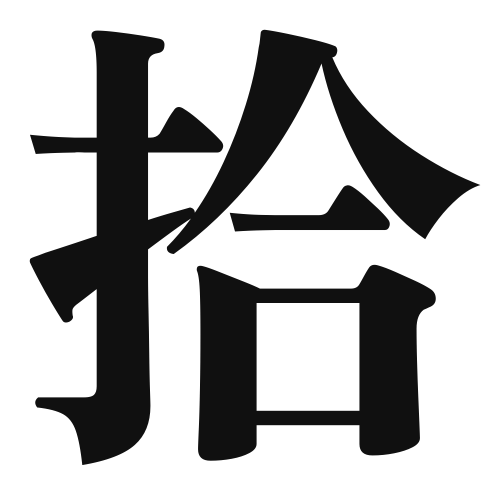1. Overview of Meaning
The kanji “拾” (pronounced “shuu” or “hiru”) means “to pick up” or “to gather.” It is often used in contexts where something is collected or retrieved from the ground or another surface.
2. Formation and Radical
Formation of the Kanji: The kanji “拾” is a combination of a phonetic component and a semantic component. It is classified as a compound character (会意文字), where the left side represents the concept of “hand” (手) and the right side indicates the action of “gathering” or “collecting.”
Radical: The radical for “拾” is “手” (meaning “hand”), which is often associated with actions involving the hands.
3. Examples of Usage
Common Words and Phrases: Some common words that include “拾” are:
- 拾う (hiru) – to pick up
- 拾得物 (shūtokubutsu) – lost and found items
Example Sentences in Daily Conversation:
- 道に落ちているゴミを拾いました。 (Michi ni ochite iru gomi o hiru mashita.) – I picked up the trash that was on the road.
- 彼は拾った犬を家に連れて帰りました。 (Kare wa hirotta inu o ie ni tsurete kaerimashita.) – He brought home the dog he picked up.
4. Synonyms and Antonyms
Similar Kanji: A similar kanji is “取” (toru), which also means “to take” but can imply a broader range of actions, including taking possession of something.
Opposite Kanji: An antonym for “拾” could be “落” (oru), which means “to drop” or “to fall,” indicating the opposite action of picking something up.
5. Cultural and Historical Background
Relation to Japanese Culture: The act of picking up items is often associated with respect for the environment in Japanese culture, where cleanliness and tidiness are highly valued.
Proverbs and Idioms: One common saying is “拾う神もあれば、捨てる神もある” (Hirou kami mo areba, suteru kami mo aru), which translates to “There are gods who pick up and gods who throw away,” suggesting that fortune can come from unexpected places.
